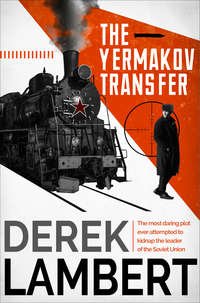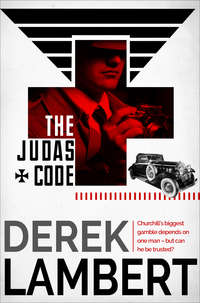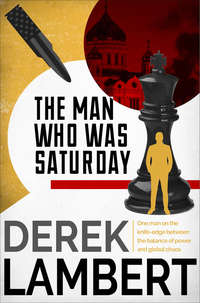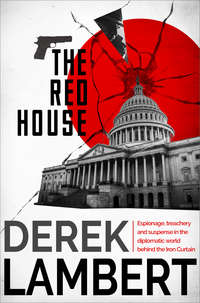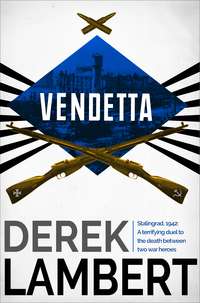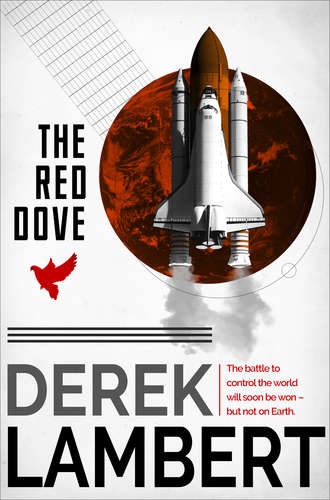
Полная версия
The Red Dove
Talin took over. There was no manoeuvrability to the left, only to the right. That meant that, although he was committed to a curving glide, he could bring the ship right round again to the strip.
He tightened the circle. Dove completed its northward arc and began to return on a southward curve towards the runway.
‘Just tell me one thing,’ Talin said. ‘How the hell did you get home again after you’d lectured at the University?’
‘Easy. I just continued on round the other side of the city.’
‘If I miss the strip this time I’ll have to go round again.’
‘I wouldn’t advise it,’ Sedov said. ‘You should have touched down at 235 mph. By the time you get there on this lap you’ll have lost so much speed that we’ll probably land like a spent meteorite.’
‘You should have been a doctor,’ Talin said, ‘you have a perfect bedside manner.’
‘Take her down a little,’ Sedov advised.
Talin began his approach at 12,000 feet. He could feel Dove straining down: she didn’t want to glide any more, she wanted to answer the call of gravity.
The great tail engines, the heaviest part of the ship, tipped back jerking the nose up. Talin grappled with the hand controller, tendons on his wrists standing out like cords. Fleetingly he saw himself again as the boy on the horse, a grey, pulling on the reins as, mane flowing, it galloped through a copse of silver birch. He summoned Sonya to him, Sonya naked on the bed and, loving her, determined to keep that last picture with him. But he discovered that such pictures don’t stay, only survival stays.
Dove’s nose levelled. Below, to the right, Talin could see the strip. To one side, scattering, were the spectators. No massed crowds like those who swarmed to the launch and landing of the first American shuttle Columbia; fatalistically the Kremlin always anticipated failure.
Sedov was staring ahead, private as always. What picture had he tried to lock in his mind? Even as he wondered Talin knew; Sedov had seen a blond teenager from Khabarovsk in Siberia who wanted to become a cosmonaut.
The strip was almost beneath them. Air speed too slow, descent speed which should have been about three feet a second too fast. Talin lowered the undercarriage.
The tail was sagging again; with one last effort Talin fought the earth’s magnetism.
Tail up fractionally. A little more. The strip directly below.
They bounced. Hit again. Bounced. Dove was veering away once more, out of control, a beautiful bird hellbent on suicide. Tarmac raced past. Then they were onto the hard black soil, chasing the fleeing spectators.
Brake, brake …
Dove shuddered, stopped.
Talin closed his eyes, kept them tight shut for a moment.
Sedov said: ‘As a matter of fact I’ve still got that old Volga. You just qualified to drive it.’
Three hours later in the debriefing centre Talin switched on the radio to pick up the news.
‘Dove 1, command ship of what will one day comprise a fleet of space shuttles, today completed its maiden flight without a hitch.’
Talin switched off the radio.
CHAPTER TWO
He was seventy-two years of age and he enjoyed chopping down trees.
You could almost feel his enjoyment, his companion thought, observing the play of muscles on his naked chest, hearing his grunts of satisfaction as the blade of the axe bit into the young redwood.
Feel it but not share it; the axeman’s companion had never enjoyed physical exertion, although to keep fit he exercised, working out thoroughly as he did most things he put his mind to. He didn’t enjoy dispatching men to their deaths but he did it competently enough.
With awe he watched the veteran take another swing at the redwood that was shading his ranch-house. His sun-reddened torso was slicked with sweat and his breathing had accelerated, but there was no evidence of real stress. God almighty! He would be an octogenarian in eight years. Yet his muscles, except perhaps around the neck, had none of the stringiness of old age, his hair was still shiny dark – possibly doctored to stay that way – and his skin was smooth.
And as if all that wasn’t enough he talked between swings. They say I’m a hard man, mused the observer who was fifty-four, but, hell, I’m a lightweight beside this guy.
The lightweight was George Reynolds, Director of the Central Intelligence Agency. His companion was the President of the United States.
Wood chips flew, the tree trembled. Reynolds wondered if it would eventually fall on the small, red-roofed ranch-house.
The President smiled and said: ‘Don’t worry, George, it won’t,’ and prepared himself for another swing.
Patiently, Reynolds waited for the dénouement: the reason for his summons from his headquarters near Washington, DC, to the presidential ranch in California, high in the Santa Ynez mountains, 160 miles north-west of Los Angeles and six miles off Coastal Highway 101.
While he waited he surveyed the terrain the way he had been trained to as a young man. He noted the lemon and avocado groves below, the glint of the Pacific, the ranch fences hewn from old telegraph poles – show the man wood and he reached for an axe – the cattle grazing in the heat of this August day in 1983.
But Reynolds didn’t observe with aesthetic appreciation. For him the woods behind the ranch were cover for an assassin who could easily out-shoot the two guards standing fifty yards from them. In the expanse of ocean he pictured a gunboat. The President had been shot once; it must never happen again. And it was with relief – although security was the responsibility of the Secret Service, not the CIA – that he heard the clatter of a surveillance helicopter.
The President leaned on the axe handle, polished by his hands, as though the helicopter had disturbed his rhythm. One hand strayed to the puckered scar on his chest left by the bullet fired by the would-be assassin; he pulled it away as if the scar had burned his fingers. From the pocket of his blue jeans he took an orange handkerchief and wiped his forehead.
Grinning, he said to Reynolds: ‘How about a few swings, George? Could do wonders for your golf. In any case you look far too neat for this kind of country.’
Reynolds became aware of his grey lightweight suit, black Capitol Hill shoes, red and blue striped tie, button-down collar. With his prematurely silver hair, as fine as a baby’s, his disciplined features and his jogger’s physique, he looked like any Washington bureaucrat who had almost made it. But Reynolds could adapt. He took off his jacket and tie and he was a countryman.
The President handed him the axe and he swung it, efficiently but without pleasure. The redwood swayed – in the direction of the ranch. As Reynolds swung, as the helicopter slanted away, the President began to talk.
‘Thought I’d get you out here, George, because it’s a place where a man can talk, where the air is clean – and free of your kind of bugs.’ He shaded his eyes and stared at the branches of the redwood with their hemlock leaves. ‘You know it’s a real shame to cut down a young tree like this. Did you know one of them once grew to 364 feet?’
‘It looks like a sequoia to me,’ Reynolds said.
‘If it was I sure as hell wouldn’t cut it down, George. They’re pretty damn rare.’ And then: ‘Hey, I didn’t know you knew anything about trees. Did you read it up on the jet?’
‘I like to be prepared,’ Reynolds admitted, ‘for every eventuality.’
‘Cattle too?’
‘I read up on farming, sure.’
‘You’re a wily old bird, George.’
‘Dumb birds don’t keep this job, Mr President.’
‘And a rare bird,’ the President said.
Reynolds paused before lifting the axe. He was pleased there wasn’t any ache in his muscles. ‘Rare?’
‘You enjoy your profession in an age when it’s fashionable to be masochistic about it. Do you ever read about happy spies these days?’
Reynolds considered this. Was he happy? He’d never really thought about it. Perhaps that indicated happiness; no, a more neutral condition, at best contentment. What ensured that contentment was the knowledge that he was the only man to do his job, the only man in an age of doubt to acknowledge that to help your country to survive you had to be devious and ruthless.
In his devious and ruthless way Reynolds was the ultimate patriot and his life was littered with sacrifices. No wife and children, no real home. No social life to speak of. He had dispensed with these in the interests of efficiency.
A warm breeze ruffled Reynolds’ baby-silk hair as he said: ‘I never read about fictional spies, Mr President.’ He swung the axe.
‘But you are human and you are wondering why I brought you here.’ The President’s voice became more incisive. ‘My term of office comes to an end in just over a year in November 1984.’
‘But not necessarily your Presidency.’
‘I’m a bit old in the tooth to stand again for election.’
‘Not you,’ Reynolds said.
‘Well, I’m going to anyway, George.’
‘I’m glad to hear it.’ Reynolds paused. ‘Really glad.’
‘But I need something to rejuvenate me in the public eye.’
Reynolds tugged the axe from the trunk of the redwood. The tree was beginning to lean, trapping the blade. ‘Not necessary,’ he said. ‘You’ve still got the looks, the brain, the body. Hell, you don’t look any older than –’
‘Leonid Brezhnev?’
‘Twenty years younger.’
‘Thank you, George. Old men need flattery. Then let’s put it another way, a way that will appeal to you: the United States needs a boost. The Russians have been calling the shots lately, it’s time we called the tune.’
‘What had you in mind?’ Reynolds asked cautiously. He leaned on the axe. The wood at the apex of the triangular wound made by the axe groaned as the tree swayed.
‘First there was Afghanistan,’ the President said. ‘Then there was Poland.’
‘But they withdrew from Poland.’
‘In their own good time.’
‘They’d still be there if it wasn’t for the stand you made.’
‘Never mind, they made their point, re-affirmed their strength. Then they threw out twenty of our diplomats from Moscow. All your men, George.’
‘We reciprocated,’ Reynolds reminded him.
‘Fantastic! Great PR. Reciprocation – diplomatic bullshit for playing second fiddle.’
The conversation was being honed into an attack. But what, Reynolds wondered, was he being set up for? The helicopter returned; the two guards looked up, hands instinctively moving towards their guns; one of them spoke into his radio-set, they both relaxed.
Reynolds waited.
The President said: ‘Here, let me finish the job, put the tree out of its agony.’ He reached for the axe. ‘What we need, George, is a spectacular.’ To the two guards he shouted: ‘Better move your asses, she’s about to go.’
The two big men, one bald, one heavily moustached, moved away looking ruffled – their vantage point had been carefully calculated and falling trees had no part in their scheme of things.
‘A spectacular?’
‘Before the election,’ the President said. He examined the wound in the tree, stared calculatingly at the ranch. To Reynolds who was only a rustic by default it still looked as though the tree would smash through the roof. ‘Three more strikes should do it.’
The President walked to the other side of the leaning redwood and measured his swing. The blade sliced into the hinge of wood still holding the trunk.
Reynolds joined the President who was spacing his last blows. ‘What sort of a spectacular?’ he asked.
‘Think like a Russian,’ the President said. ‘Think what they’d like to do to us – then do it first.’
The second blow thudded into the tree.
‘How long did I invite you for, George?’
‘Three days,’ Reynolds told him.
‘Then that’s how long you’ve got. I’d like an outline of your project before dinner on Saturday.’
‘And if I can’t make it by then?’
‘The atmosphere over dinner will be strained.’
The President wiped the sweat from his forehead with the back of his hand. The muscles on his arms and chest tensed. He had said the third blow and the third blow it had to be.
Steel met wood. The tree creaked. Swayed. Leaned into space and crashed to the ground twenty-five yards to the right of the ranch-house.
As it happened the idea came to Reynolds just before dinner that night. He wondered if it had occurred to him before only to be rejected by his subconscious because of its sheer audacity.
He was drinking a martini with the President and his wife in the lounge of the ranch-house, a long beamed room stamped with the President’s personality. There were islands of skins on the tiled floor, historical bric-à-brac from the Wild West on the walls and shelves. A stone fireplace that still smelled of winter fires occupied one corner; through an opened window the great outdoors breathed indoors.
The President’s wife, slight and blonde and astute with a smile that was both practised and genuine, held up the cocktail shaker. ‘Another, George?’
He shook his head. One on working days, two on vacations; today, like most days, had developed into a working day.
She didn’t pursue it; she was an accomplished hostess who had brought back The Grand Style to the White House. Dressed now in a French-blue dress, the First Lady even managed to instil sophistication into the Ponderosa setting. Her husband hadn’t tried, he wore a check shirt and slacks.
She said to Reynolds: ‘We thought we’d watch the touchdown before dinner. Is that all right with you?’ Without waiting for an answer she switched on the TV set beside the wall-to-ceiling book-shelves.
Mission Control at Johnson Space Center, Houston, flickered into view, followed by a shot of the 15,000-foot runway at the Kennedy Center in Florida where the fourth Space Train to be sent into orbit was due to land.
The first shuttle had landed on Rogers Dry Lake at the Dryden Space Center in California’s Mojave Desert. Now Kennedy was geared to take most of the traffic.
As far as Reynolds was concerned the space centre that mattered was Vandenberg, not far from the Presidential ranch. From its $200 million launch complex shuttles flew over the North and South Poles keeping most of the populated world under surveillance. Even more important was the Military Mission HQ inside Cheyenne Mountain in Wyoming where they concentrated on spy satellites, beam weapons, war in space …
Shots of the approach to Florida taken by cameras inside the shuttle appeared on the TV screen. But the crowds waiting for landing were nothing compared with the great concourse that had assembled for the first touchdown. Commuting with space had been accepted more smoothly than the first railroad engine.
It was a remark by the First Lady while they were watching the TV that first exploded possibilities in Reynolds’ brain.
The President was talking about a future in which space stations, laboratories, hotels, whole complexes would orbit the globe, their occupants flying back and forth from the earth like New Yorkers commuting between Long Island and Manhattan.
On the screen Columbia with its stocky, delta-winged body and foraging beak, was making its last turn before its final approach. Beneath it Florida and the cobalt-blue Atlantic looked like a relief map.
‘But who owns space?’ she asked. ‘How can it be divided?’ In the same tone, Reynolds reflected, that a president’s wife might once have dismissed pioneers’ claims to the West.
He finished his cocktail and told her: ‘I don’t know the answers to your questions but I do know that, if it is divided, it will be divided through strength. Through strength, not necessarily aggression,’ holding up one defensive hand.
‘At least we got the shuttle up there first,’ the President said. ‘We’ll bargain from power.’
‘That depends,’ Reynolds said, ‘on what the Soviets have got up their sleeves. We know they shelved their own basic shuttle because we got up there first. We know they’ve now launched their own modified ship and we know they plan to assemble a space station in space. What we don’t know is the capability of their new ship and how many of them they’ve got.’
On the screen the Columbia was gliding towards the runway, smoother than a conventional jet.
‘What sort of capability are you talking about?’ the President asked.
‘The capability to command space,’ Reynolds said crisply. ‘To win the next war – if the Russians want one.’
‘Beams?’
‘To put it more definitively CPBs, charged particle beams. Rays capable of travelling at the speed of light,’ he explained to the President’s wife, ‘and penetrating a target instead of just melting its surface like an ordinary laser. You may recall that in ’77 General George Keegan, head of Air Force Intelligence, quit his job because your husband’s predecessor didn’t take his warnings seriously. Well, a lot of people at the Pentagon figure that the Russians have been working on a scheme to equip their shuttles with CPBs. That way they could command the heavens.’
‘Pearl Harbor in space,’ the President said. ‘Except that I have heeded the warnings.’
‘Star Wars,’ murmured his wife. ‘Unbelievable, terrifying.’ And, as Columbia straightened out over the runway, she pointed at the screen and said: ‘If there was such a war that could be a crippled Soviet shuttle landing in the United States,’ which was the remark that, like a depth charge, projected inspiration from the depths of Reynolds’ subconscious.
As he watched Columbia touch down he imagined red stars on its wings. From the cockpit he heard Russian voices. At the head of the stairway he saw a cosmonaut emerge, wave wearily and depart for the medical centre leaving behind at the end of the runway the greatest military prize ever deposited in the lap of the United States.
But why do I only see one cosmonaut? he wondered.
‘George, it’s all over.’ It was the President’s voice but Reynolds heard it from a long way off. ‘George, I’m speaking to you. Dinner’s ready for God’s sake.’
Reynolds followed them into the dining room, sat down and began to eat his prawn cocktail.
The First Lady poured chilled Californian white wine and said: ‘George, are you all right? You look as though you’ve seen a vision.’
Which he had. It seemed extraordinary to him that neither the President nor his wife had seen it. But why only one cosmonaut? There should have been at least two on board, more with mission specialists.
He sipped the wine, held it up to the light of the sunset flaming on the horizon. As he did so he re-focused his attention on his hosts. ‘Forgive me,’ he said to the President’s wife. ‘I was thinking about something your husband said this afternoon.’
Later, over T-bone steaks and green salad, he resurrected the shuttle landing but only circumspectly because, at this stage, he didn’t want to share his vision with anyone, least of all the President, in case it had no substance.
‘You would have thought,’ he said casually, ‘that both the astronauts would have emerged at the same time.’
They stopped eating and looked at him in surprise. The President said: ‘But we didn’t see any of them come out,’ and his wife asked: ‘Are you sure you’re feeling all right?’
‘I’m sorry,’ Reynolds said, ‘I was thinking ahead,’ and before they could work that one out he added: ‘I guess I’ll turn in early tonight. Chopping down trees is okay for a 72-year-old Peter Pan but not for a middle-aged mortal.’
After dessert he excused himself and went to his room. For a time he lay on the bed fully dressed, hands behind his head, thinking. Why only one cosmonaut?
He closed his eyes. He was back in Moscow in the early seventies when he was counsellor and CIA co-ordinator in the US Embassy. And he was at a rendezvous in Sokolniki Park with a double agent from GRU.
It was sweaty hot, he remembered, and in front of the bench where he was waiting a group of children on bicycles and tricycles were learning road drill on a mock-up street complete with traffic lights.
The man who joined him was well cast for the meeting. The park had once been a hunting ground for the Tzars – Sokolniki was a derivation of sokol meaning falcon – and Vadim Muratov looked like a bird of prey. Lean, greying and greedy.
The exchange was a cliché but still the way they did it in the eighties. One crumpled copy of Pravda containing Muratov’s payment, 300 roubles-worth of coupons which he could spend in the beryozka shops; one crumpled copy of Trud containing the information Muratov was selling.
Each picked up the other’s newspaper and, after watching the children for a few moments, went their respective ways. The mock-up traffic lights, Reynolds recalled, had jammed at red as he left.
In his office in the embassy Reynolds studied Muratov’s 300 roubles-worth of information. It wasn’t calculated to set either the River Moskva or the Potomac on fire. Not then.
According to Muratov a young cosmonaut named Nicolay Talin, quite brilliant apparently, a future captain of space, had been investigated by GRU because of his outspoken views. He was a bit of a rebel, not a totally unacceptable attitude – the Soviet Union had been founded on rebellion – but his views were idealistic and if idealism didn’t conform with the Communist dream then it was criminal.
But Talin was getting away with it for two reasons. (1) He was an exceptionally gifted candidate for aerospace travel; (2) He was being protected by a senior KGB officer named Oleg Sedov.
And that was all. Reynolds instructed a junior CIA officer to check out Talin and then, because it wasn’t that urgent, sent the details to Washington by courier and forgot them. Until today.
Suddenly Reynolds knew why, in his vision, only one cosmonaut had emerged from the Russian shuttle; the others were either dead or wounded. Nicolay Talin had been persuaded to defect and had overcome the rest of the crew. The President just might have his spectacular. Reynolds reached for the bedside telephone and called CIA headquarters.
Reynolds slept fitfully that night, dreams and waking thoughts merging into a confused interrogation. The subject of the interrogation was himself, the topic truth – an elusive quality when you were the director of an organisation specialising in deception.
And, under this jumbled third-degree, he admitted that, although he was the ultimate patriot, his sentiments regarding the President’s spectacular were not entirely chauvinistic. There was an element of personal interest in them, a touch of self-preservation.
Recently, yet another Congressional inquiry into the activities of the CIA had been mounted. In Reynolds’ opinion the KGB couldn’t do a better hatchet job on the Company than some of the United States’ own politicians. What he couldn’t abide was their naïvety, assuming, that was, that there were no darker motives. Why, in God’s name, undermine your own clandestine defences while your enemies systematically expanded theirs?
In a waking moment Reynolds recalled the words of a certain crusading politician:
‘If we accept this idea of secrecy for secrecy’s sake, we will have no way of knowing whether we have a fine intelligence service or a very poor one. Secrecy now beclouds everything about the CIA – its cost, its efficiency, its successes and its failures.’
That had been said way back in 1956 by Senator Mike Mansfield from Montana. Nothing had changed. Secrecy for secrecy’s sake … How the hell could a secret service be overt?
Since taking office, immediately after the President had been elected, Reynolds had survived every investigation, arguing coldly and contemptuously that CIA duplicity was a necessary evil designed to combat the far more sinister intrigues of the Soviet Union and its lackeys. In the anti-Soviet mood prevalent in the US Reynolds had coasted home.
But the latest inquiry was the most dangerous yet.


